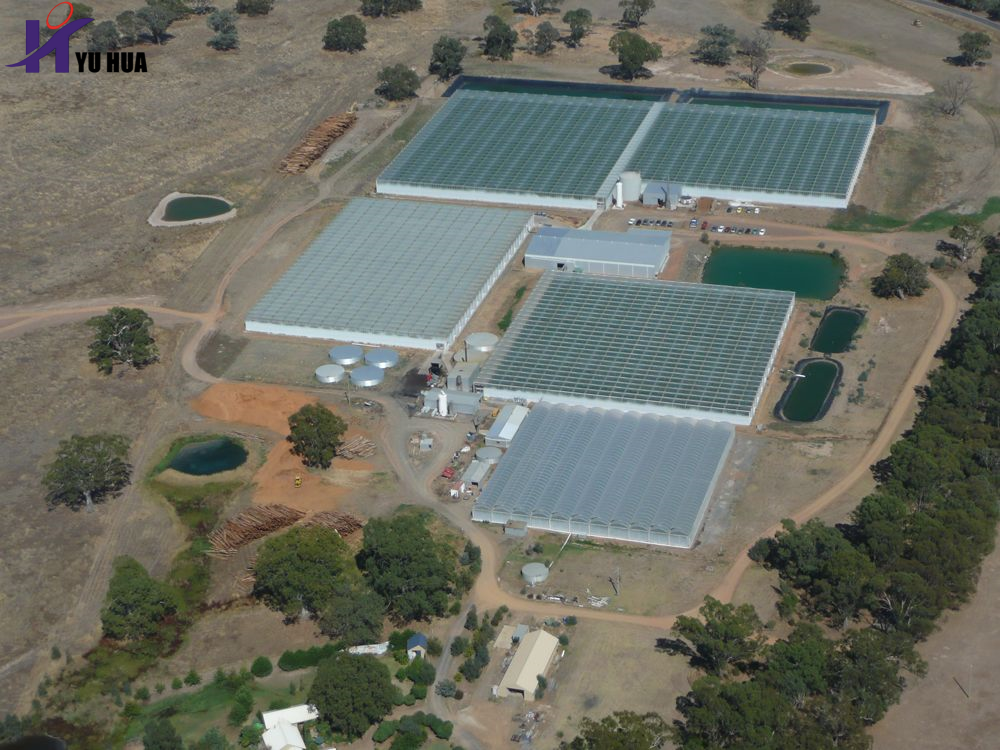
The best greenhouse panel for you.
For large-scale high-performance commercial greenhouses, the best greenhouse covering material is glass. Glass greenhouses are a common form of modern agriculture. They have good light transmittance, strong thermal insulation, long life, beautiful appearance, strong environmental control, high planting density, high yield, wide applicability, and can plant most crops and off-season planting.

Lighting has always been the first factor in greenhouse construction. Having high-transmittance greenhouse special glass is a prerequisite for ensuring high greenhouse production capacity. The glass specifications that can be used in glass greenhouses on the market are now divided into two categories.
The first type:
Ultra-white Nashiji diffuse glass
The transmittance of ultra-white Nashiji diffuse glass is 91.5%, which is the basic transmittance specification currently used in glass greenhouses. It can be said that this is also the minimum specification required for greenhouse planting.
Scattering glass is divided into 8 haze specifications, and different haze specifications are pressed out by special sticks. Each haze represents a different hemispherical transmittance. Scattering glass ensures that the greenhouse can guarantee the highest transmittance at different times throughout the day.
It starts when the sun shines on the greenhouse glass at sunrise and ends at sunset, from 15° at sunrise to 90° vertical at noon, and then to 15° at sunset. There are standard light transmittance standards. These standards ensure that the greenhouse has sufficient light
Fog is the only standard for greenhouse glass. Unlike other types of glass, only greenhouse-specific glass has professionally designed fog standard specifications.
Second type:
Ultra-white Nashiji anti-reflective glass
Anti-reflective glass is coated on scattering glass to make the light transmittance higher, with a minimum light transmittance of 97.5%.
After long-term use, there will be dust on the surface of greenhouse glass, and the equipment needs to be cleaned frequently. There is a certain demand for the hardness of the coating layer. The high film hardness ensures that the light transmittance will not decay.
The coating process of greenhouse glass uses etching coating. The film layer formed by the etching coating process is integrated with the glass, and the hardness is the same as that of the glass. As long as the glass is not damaged, the light transmittance will not decay.
The coating layer of anti-reflective glass not only ensures high light transmittance, but also has a certain hydrophilicity. The hydrophilicity of greenhouse glass can prevent condensation of water droplets on the glass surface, prevent water droplets from dripping, and cause crop yield reduction.
The above are two specifications of glass used in glass greenhouses. In terms of glass specification design, you can choose two thickness specifications of 4-5mm. The size can be designed by yourself, and the pattern can be selected between Nashiji (recommended), double velvet, and Prismatic.
The choice of haze is the most important technical standard. There are eight types of haze for greenhouse glass. This requires technical investigation of the lighting conditions of the project site to choose.

When we choose greenhouse glass, the first thing to determine is the type of glass, anti-reflective glass or scattering glass. After determining the glass thickness, choose one from 4mm (recommended)-5mm, then determine the glass haze specification, 8 types of haze suitable for the project, and finally determine the size.
The diffuse glass and AR-coated diffuse glass produced by Yuhua have cooperated with many large commercial greenhouses in agriculture, horticulture, nurseries and experiments. We have cooperated with large greenhouse project companies such as Havecon, Van Der Hoeven, Kubo, etc. for many years. Yuhua greenhouse glass has a light transmittance of up to 99%, and haze 5/10/20/30/50/70/75 greenhouse diffuse glass is available!
Need more detailed information or a solution of greenhouse glass? Need guidance on how to choose the right glass for your greenhouse?
Consult online customer service, leave us a message or send us an email!
Tags:anti-reflective glass diffuse glass agricultural greenhouses glass greenhouse venlo greenhouse AR glass greenhouses glass agricultural glass horticultural glass #greenhouseglass #Antireflectiveglass #Diffusetemperedglass #Ultrawhitefloatglass #agriculturalgreenhouseglass #diffuseglass #horticulturalglass #Tomatogreenhouse #Coloredpeppergreenhouse #Lettucegreenhouse #Agriculturalgreenhouse #ARglass #venlogreenhouse #greenhouseglass #Antireflectiveglass #Diffusetemperedglass #Ultrawhitefloatglass #agriculturalgreenhouseglass #diffuseglass #horticulturalglass #Tomatogreenhouse #Coloredpeppergreenhouse #Lettucegreenhouse #Agriculturalgreenhouse #ARglass #venlogreenhouse #GlassManufacturer #invernadero #ArchitecturalGlass #ClearFloatGlass #FloatGlass
Previous:2025, a new beginning!



















